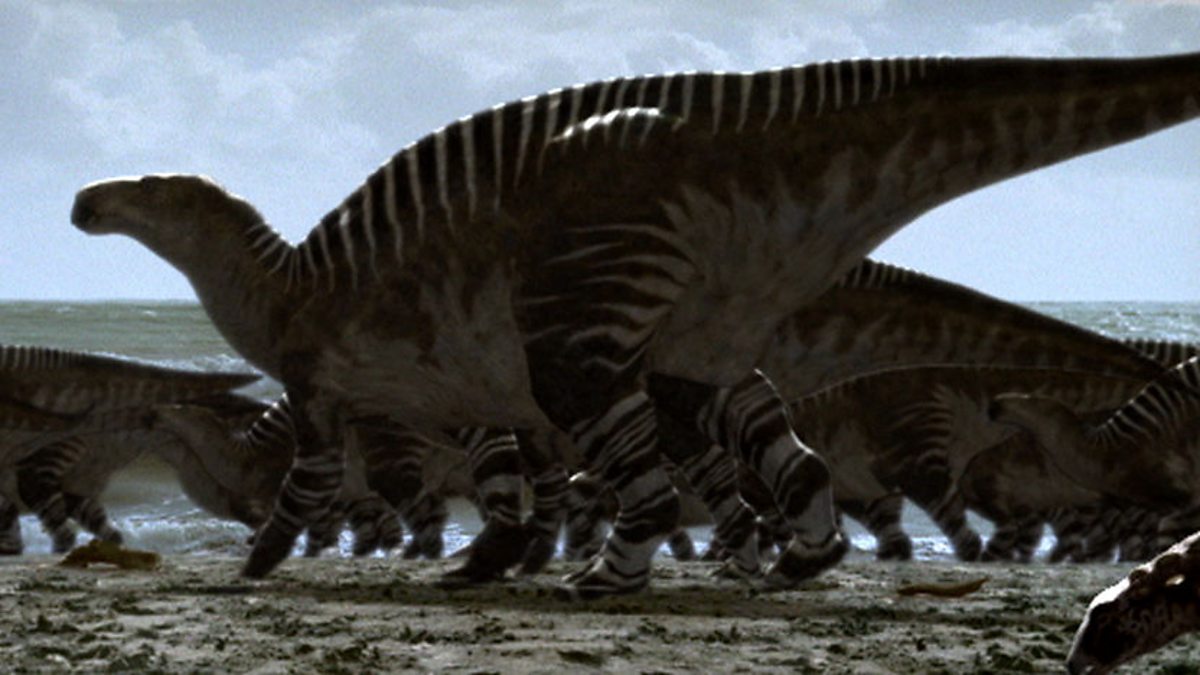
Posted on 08/08/2018 12:28:30 PM PDT by ETL
Paleontologists have discovered the first North American co-occurrence of hadrosaur and therizinosaur tracks, providing more evidence that Alaska was the ‘superhighway’ for dinosaurs between Asia and western North America 65-70 million years ago (Late Cretaceous epoch).
In 2012-2014, Dr. Anthony Fiorillo from the Perot Museum of Nature and Science and colleagues discovered distinct footprints in Denali National Park, central Alaska Range, that they determined to be made by therizinosaurs, unusual predatory dinosaurs thought to have become herbivores.
What surprised the team most was the co-occurrence of dozens of hadrosaurs, also known as duck-bill dinosaurs.
“Hadrosaurs are very common and found all over Denali National Park. Previously, they had not been found alongside therizinosaurs in the park,” Dr. Fiorillo said.
“In Mongolia, where therizinosaurs are best known — though no footprints have been found in association — skeletons of hadrosaurs and therizinosaurs have been found to co-occur from a single rock unit so this was a highly unusual find in Alaska, and it prompted my interest.”
“From our research, we’ve determined that this track association of therizinosaurs and hadrosaurs is currently the only one of its kind in North America.”
The plant-eating therizinosaurs, which are rare and unusual creatures in the fossil record, had long skinny necks, little teeth, a small beak for cropping plants, and big torsos accompanied by large hind feet and long arms. ..."
Dr. Fiorillo has long postulated that Cretaceous Alaska could have been the thoroughfare for fauna between Western North America and Asia — two continents that shared each other’s fauna and flora in the latest stages of the Cretaceous.
“This study helps support the idea that Alaska was the gateway for dinosaurs as they migrated between Asia and North America,” said co-author Dr. Yoshitsugu Kobayashi, of Hokkaido University Museum in Japan.
(Excerpt) Read more at sci-news.com ...
Bwaaa-Haaa-Haaa!
drill baby drill, dinosaurs make good oil.

...don't ask


Road rage?
To my knowledge, no Therizinosaur skull has ever been found. Just arms, claws, and leg bones.
How can anybody tell it was a plant-eater?
They must be putting feathers on dino’s again to justify “evolution”.
>>To my knowledge, no Therizinosaur skull has ever been found.
>>Just arms, claws, and leg bones.
>>How can anybody tell it was a plant-eater?
Every so often a dino from the Jurassic period turns up in Cretaceous Rock and the scientists always do their best to jingle their way out of how that happened.
They’ve also found dino skeletons above the so-called “Z-coal line” or K/T Boundary (Post Cretaceous Era). Hardly anything like that gets published.
Skull has never been found, even Wikipedia says so :0
Yes, I know. But somewhere it had said they had at some point realized or believed it was very similar/closely related to another dinosaur in which skulls had been found. The other had plant eating teeth. I’m on a tiny smartphone right now so it’s a real pain in the arse to look for and post stuff. Tomorrow I’ll look again.
They might be able to tell by the ratio of the various species. There would be a number of herbivores, but very few carnivores for the various ecological niches.
I wonder which direction they were heading..
>>To my knowledge, no Therizinosaur skull has ever been found.
>>Just arms, claws, and leg bones.
>>How can anybody tell it was a plant-eater?
From Wikipedia...
See especially the last paragraph.
Also, plant eaters often have large guts/rib cages for disgesting large amounts of plant matter.
From Wiki:
Though the fossil remains of Therizinosaurus are incomplete, inferences can be made about their physical characteristics based on related therizinosaurids.
Like other members of their family, Therizinosaurus probably had small skulls atop long necks, with bipedal gaits and heavy, deep, broad bodies (as evidenced by the wide pelvis of other therizinosaurids).
Their forelimbs may have reached lengths of up to 2.5 metres (8.2 feet)[1] or even 3.5 metres (11.5 feet) in the largest known specimen.[2] Their hindlimbs ended in four weight-bearing toes, unlike other theropod groups, in which the first toe was reduced to a dewclaw.
In 2010 Gregory S. Paul estimated the maximum size of Therizinosaurus at 10 metres (33 ft) in length and five tonnes in weight.[2] They are the largest therizinosaurs known, and the largest known maniraptorans.[2]
The most distinctive feature of Therizinosaurus was the presence of gigantic claws on each of the three digits of their front limbs. These were common among therizinosaurs but especially large in Therizinosaurus, and while the largest claw specimens are incomplete, they probably reached 0.7–1 metres (2.3–3.3 ft) in length.
The claws are the longest known from any animal.[3] The claws were relatively straight, only gradually tapering into a point, as well as extremely narrow and transversely flattened.[2][4][5][6]
The feeding habits of Therizinosaurus are unknown since no skull material has ever been found that could indicate their diet. However, like other therizinosaurs, they were probably primarily herbivorous.[7]
https://en.m.wikipedia.org/wiki/Therizinosaurus
The early history of therizinosaur research occurred in three phases. The first phase was the discovery of scanty and puzzling fossils in Asia by the Central Asiatic Expeditions of the 1920s and Soviet-backed research in the 1950s. This phase resulted in the discovery of the Therizinosaurus cheloniformis type specimen. Soviet paleontologist Evgeny Maleev interpreted these unusual remains as belonging to some kind of gigantic turtle.[1]
The second major phase of therizinosaur research followed the discovery of better preserved remains in the 1970s by collaborative research between the Soviets and Mongolians. These finds revealed the true nature of therizinosaurs as bizarre dinosaurs.[1] However, the exact nature and classification of therizinosaurs within Dinosauria was controversial as was their paleobiology.
When Rozhdestventsky first reinterpreted therizinosaurs as dinosaurs he argued that they were unusual theropods that may have used their clawed arms to break open termite mounds or collect fruit.[2] Osmolska and Roniewicz also considered therizinosaurs to be theropods.[1]
In 1979, Altangerel Perle named the new species Segnosaurus galbinensis, which although he recognized was an unusual theropod, he did not recognize as a therizinosaur. Consequently, he named the new family Segnosauridae and, in 1980, Segnosauria.[1]
Two years later, Perle recognized commonalities between Therizinosaurus and segnosaurs, reclassifying the former as a member of the latter. From hereout therizinosaur research was considered "segnosaur" research.[3] Perle himself thought that his "segnosaurs" were semi-aquatic fish-eaters. However, in the early 1990s, researchers like Rinchen Barsbold and Teresa Maryańska cast doubt on the connection between therizinosaurs and segnosaurs altogether.[3]
Nevertheless, the description Alxasaurus elsitaiensis provided more evidence for a close relationship between the therizinosaurs and "segnosaurs" and led to a revision of their classification.
The discovery of this and other primitive therizinosaurs in China formed the beginnings of the third major wave of therizinosaur research.[1] That same year Russell and Russell reinterpreted therizinosaurs as herbivorous foragers like mammalian chalicotherium.[2] Other significant finds of the 1990s include therizinosaur eggs with embryos preserved inside[4] and the first known therizinosaur with feathers, Beipiaosaurus, which was described from China in 1999.[5]
https://en.m.wikipedia.org/wiki/Timeline_of_therizinosaur_research
There’s too many unanswered questions about the “Therizinosaur” to justify what the current scientific community classifies it as.
Like the Apatosaurus skull that was hard to find, until we get a full skeleton it’ll remain a mystery IMHO.
They love to claim new species are discovered all the time, when in most cases new dinos are simply juvenile or adolescent versions of full grown adults. Even Robert Bakker has admitted this.

Disclaimer: Opinions posted on Free Republic are those of the individual posters and do not necessarily represent the opinion of Free Republic or its management. All materials posted herein are protected by copyright law and the exemption for fair use of copyrighted works.